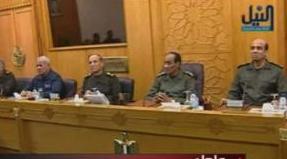 CAIRO – Egypt's military rulers have posted a Facebook poll to gauge the popularity of nearly 20 presidential hopefuls, an attempt to show their commitment to a democratic transition in the face of rising criticism of their management of the country.
CAIRO – Egypt's military rulers have posted a Facebook poll to gauge the popularity of nearly 20 presidential hopefuls, an attempt to show their commitment to a democratic transition in the face of rising criticism of their management of the country.
The governing council's outreach to the public on the political process was a novelty after three decades of authoritarian rule by President Hosni Mubarak, who is accused of overseeing a corrupt system heavily controlled by his family and cronies.
Skeptics, who say the military is just perpetuating the Mubarak regime's tight controls on politics, suspect the poll may just be a way for the generals to promote their favorite candidate.
Political analyst Emad Gad also suggested the military may be shopping for candidates to back.
"Maybe the military is thinking about backing one candidate and wants to get an indication about the relative weight of the candidates. If the public is divided, maybe they can nominate one of their own," he said.
Elections under Mubarak were consistently marred by fraud and rigging. The first parliamentary elections since Mubarak was ousted on Feb. 11 in a popular uprising are expected in September. The date for the presidential elections is not yet clear.
According to the initial timetable set in the military-sponsored transitional plan, the presidential vote should be by year's end.
The online survey, which had garnered more than 100,000 responses by Tuesday, listed 18 possible candidate, including pro-reform leader Mohamed ElBaradei, the first female hopeful Bothaina Kamel and former regime officials. Most prominent among them is the country's former intelligence chief, Omar Suleiman, who Mubarak appointed as his first vice president as one of his final attempts to cling to power.
As of Tuesday, ElBaradei was in the lead with 35 per cent of the votes, followed by prominent Islamic scholar Mohammed Selim al-Awa.
The monthlong poll that opened Sunday is not scientific — reaching only about a fifth of the population of 85 million who have access to the Internet. But it could be an indicator of the front-runners ahead of the balloting.
Still, many welcomed the military's effort to reach out to a public that has grown critical of unilateral army decisions since Mubarak stepped down.
The political forces that emerged after the uprising have found themselves divided over the transition timetable with the debate focusing on whether to first have parliamentary elections or write the country's new constitution.
Some fear that if elections come first, the fundamentalist Muslim Brotherhood — the most well organized political group at the moment — could take a large share of the parliament and heavily influence the drafting of the new constitution.
The military has been trying to tap into the influence of social media networks that have helped fuel the mass protests, which were largely led by secular, middle-class youth.
Mahmoud el-Hetta, a member of the National Association for Change, a leading group in the protest movement, said the military's motives were uncertain. But he hailed the poll as a recognition by the military that Facebook activists are public opinion-makers.
"They want to reassure the people that they will transfer power to a civilian president. But they also want to know the opinions of the population of youth who mobilized and worked with the protesters," he said.
It was a popular Facebook page created in memory of a torture victim that played a key role in mobilizing the 18-day revolution.
"This is a poll conducted by the military council. Whoever wins will be a rising star. The public, many of whom are largely still trustful of the army, will begin talking about that candidate," el-Hetta said.
Weighing in on the debate about the shape of the new constitution, Al-Azhar, the pre-eminent institute of Islamic learning in the Sunni Muslim world, said there is no room in Islam for a "theocracy" and called for a democratic transition that allows for separation of powers.
Al-Azhar is touted as the bastion of moderate Islam, promoting women's rights and tolerance of others. But it has also come under the shadow of the Mubarak regime, criticized domestically for always toeing the government's line.
The Al-Azhar document, signed by members of the learning institute as well as prominent Muslim and Christian public figures, appears aimed to revive its role as an independent national institute that safeguards the principles of moderate Islam.
"It is attempting to drown out the extremist voices in this national debate," Gad said.
CAIRO – Egypt's military rulers have posted a Facebook poll to gauge the popularity of nearly 20 presidential hopefuls, an attempt to show their commitment to a democratic transition in the face of rising criticism of their management of the country.


